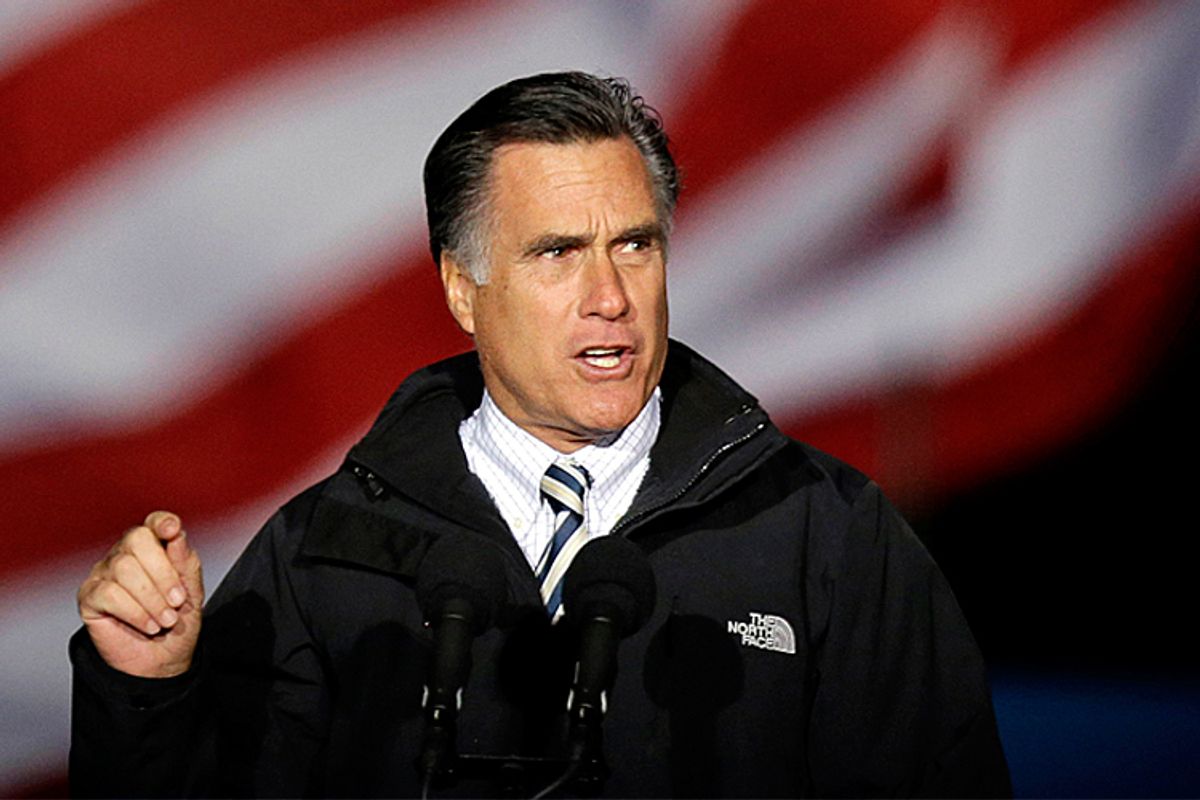The piping hot news out coming out of the mercifully still distant 2016 presidential campaign is that a third stab at the White House by one Willard Mitt “Mitt” Romney is a “real possibility.” That’s the word from the Washington Examiner’s Byron York, who talked with a number of people plugged into Romney’s inner circle of advisers, sycophants, and former campaign personnel who “developed an extraordinary loyalty to Romney.” Those people are apparently urging Mitt to dust off the old awkward charm and ask some more confused Americans whether they’re French Canadian.
My initial reaction to this news was “Hah. Terrific!” But after getting over that burst of ironic enthusiasm, my thoughts turned, as they so often do, to immigration reform. The big lesson of Mitt’s 2012 loss, for Republicans anyway, was that lurching to the right on immigration issues was no longer an option at the national level. Romney took up “self-deportation” as his immigration policy to ingratiate himself to skeptical conservatives, and he paid for it with drubbings in the Spanish-speaking press and an absurdly low share of the Latino vote.
Gaming out what a third Romney candidacy might look like, Hot Air’s Allahpundit wrote: “His donor-class supporters were willing to tolerate ‘self-deportation’ in 2012 because they thought he needed to pander to righties more than he did to Latinos, but that equation has now reversed. As someone said last night on Twitter, you’ll know Romney’s seriously thinking of getting in when he starts calling for comprehensive immigration reform.” But here’s the thing: Romney’s already done that. Sort of.
He’s been a little inconsistent on the issue (a shock, I know) but Mitt reacted to his own loss in the same way that much of the conservative and Republican establishment did: he flipped on immigration. A few months after the election, Romney went on Fox News Sunday and said that undocumented immigrants “should not be given a special pathway to permanent residency or citizenship” but expressed the “hope” for “some compromise or some common ground” on immigration. Later that year, he told CBS News that he supported a pathway to citizenship for undocumented immigrants. “I do believe that those who come here illegally ought to have an opportunity to get in line with everybody else.” Earlier this year, before the chances of passing reform legislation had completely evaporated, Romney said “I do believe it's important for us, before the presidential contest in 2016, to finally have immigration reform in place.”
So even if he’s not 100 percent of the way there, he’s close. And if Mitt is in fact considering another run, that shift makes sense because, again, the position of the Republican establishment post-2012 is to pass comprehensive immigration reform, and Romney is a creature of the establishment. In that way, Romney and a potential Romney candidacy help foreshadow the huge conflict looming for Republicans heading into 2016, with the establishment lining up behind immigration reform, and the conservatives digging in their heels on border security and deportations.
Assuming Romney doesn’t run, the outright favorite of the Republican establishment would be Jeb Bush, who is outspoken in his support for comprehensive reform. That support is already causing him a bit of grief. Bush just recently began campaigning for 2014 Republican candidates, and stopped by Greensboro, North Carolina to rally on behalf of GOP Senate candidate Thom Tillis. Bush laid out the argument for comprehensive reform, and Tillis felt the need to distance himself from that policy. “You have to make clear that amnesty shouldn’t be on the table, Tillis said, according to the New York Times. “That doesn’t negate any opportunity to provide some with legal status and other things, but you only do that after you seal the borders and you make the problem no longer grow.”
The other high-profile Republicans whose names get tossed around when talking about 2016 are generally anti-immigration reform hardliners. Rick Santorum opposes “amnesty” and called the bipartisan Senate Gang of Eight “dangerous.” Ted Cruz wants to deport as many people as is possible. Rick Perry set down a marker for how the 2016 immigration debate will shake out by sending National Guard troops to the border.
Other high-profile potential GOP candidates also oppose comprehensive immigration reform, but have proven themselves to be very malleable in the past. Marco Rubio was famously a member of the Gang of Eight and helped pass the comprehensive immigration reform bill that House conservatives refused to pick up. He’s since abandoned that cause and is making a high-profile effort to get back into the Tea Party’s good graces by pushing for stringent border security measures. Rand Paul is a shameless chameleon when it comes to immigration policy, taking up whatever position happens to be the Republican consensus at any given moment. Typically, during Republican primaries, candidates run hard to the right to win over the base. It will be interesting to see if these two stick to their current anti-comprehensive reform positions or switch things up again to curry some favor with the establishment moderates.
The one wild card in all this is Chris Christie. The New Jersey governor was a hands-down favorite of the GOP establishment before his aides ordered the closure of traffic lanes on the George Washington Bridge and plunged his administration into scandal. His 2016 prospects are uncertain, as is his position on immigration. Asked what his policy is earlier this month, Christie told reporters it’s a secret, and they’ll just have to wait. “I won't have anything to say on immigration unless and until I become a candidate for president of the United States,” he said. “If that happens, then I will articulate a full position on it.”
Of course, all this assumes that any candidate could withstand the crushing, all-powerful political juggernaut that would be Mitt Romney 3.0.

Shares